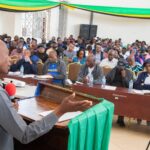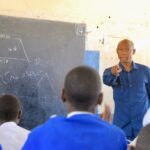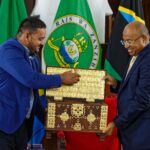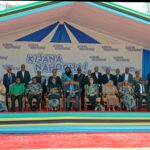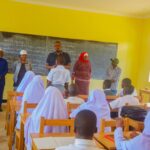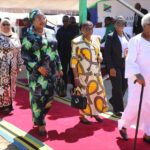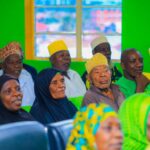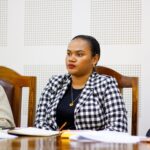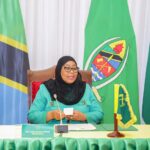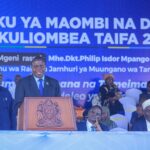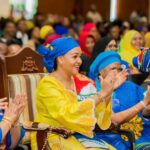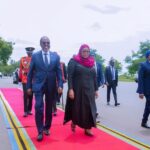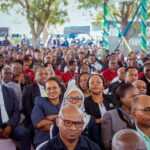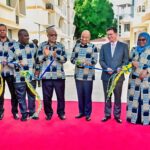Enhancing Education in Tanzania: Dr. Charles Msonde Leads Zhejiang Normal University Delegation to Kibaha Secondary School
In a significant step towards revolutionising the educational landscape of Tanzania, Dr. Charles Msonde, the Deputy Secretary General for Education in the Office of the President – TAMISEMI, recently led a delegation from Zhejiang Normal University in China to Kibaha Secondary School in the Pwani region. The objective of this visit was to assess the potential of advanced educational technologies, with a particular focus on the live teaching system, as a means of enhancing teaching and learning experiences.

Observing the Live Teaching System
The delegation’s primary focus was on the live teaching system, also known as Live Teaching, which has been implemented at Kibaha Secondary School. This innovative system facilitates real-time, interactive teaching sessions, thereby overcoming the limitations of physical distance and enabling teachers and students to engage in a more dynamic and collaborative learning environment. The delegation was eager to ascertain the extent to which this system could potentially address the chronic shortage of teachers in Tanzania, a challenge that has long plagued the country’s educational sector.

During the course of their visit, the delegation was afforded the opportunity to observe the efficacy of the Live Teaching system in practice. The delegation observed how teachers at Kibaha Secondary School employed this technology to deliver lessons in a more engaging and interactive manner. The system facilitates not only real-time communication between teachers and students, but also the sharing of digital resources, such as presentations and videos, thereby enhancing the learning experience.
Potential for Nationwide Implementation
One of the most significant outcomes of the visit was the potential for the nationwide implementation of the Live Teaching system. Dr. Charles Msonde and his team were particularly impressed by the system’s capacity to address the issue of a shortage of teachers. The capacity of Live Teaching to enable a single teacher to instruct multiple classes simultaneously represents a significant potential for the expansion of quality education to remote and underserved areas.
The delegation’s observations indicated that this technology could be scaled across the country. It was observed that with the appropriate infrastructure and training, the Live Teaching system has the potential to be a transformative force within Tanzania’s education sector. The system’s capacity to facilitate connections between students and qualified teachers, irrespective of geographical constraints, represents a promising avenue for addressing a significant challenge within the country’s education system.
Smart Class Sessions: A Glimpse into the Future
In addition to the Live Teaching system, the delegation observed two Smart Class sessions at Kibaha Secondary School. These sessions, which concentrated on the physics curriculum, offered an insight into the potential future of education in Tanzania. The Smart Class system incorporates a range of sophisticated technologies, including interactive whiteboards and digital content, to foster a dynamic and immersive learning environment.
The delegation was particularly impressed by the seamless integration of technology into the teaching process, which they considered to be a noteworthy achievement. It was observed that the Smart Class system enabled teachers to convey complex concepts in a more accessible and engaging manner. The utilisation of visual aids and interactive tools not only captured the students’ attention but also facilitated a more profound comprehension of the subject matter.
Feasibility of Dual-Class Instruction
One of the most noteworthy observations made during the visit was the feasibility of a single teacher instructing two classes simultaneously in different rooms through the Smart Class system. This innovative approach exploits technology to enhance the efficiency with which teaching resources are utilized. The utilisation of video conferencing and interactive tools enables a single teacher to effectively manage and instruct multiple classes simultaneously, thereby optimising the utilisation of available teaching resources.
Dr. Charles Msonde and his colleagues were greatly encouraged by this development. They acknowledged the potential of this approach to markedly enhance the scope and calibre of educational provision in Tanzania. The capacity to extend the expertise of a single teacher to multiple classrooms could prove instrumental in addressing the teacher shortage issue and ensuring that more students have access to quality education.
Conclusion: A Promising Future for Tanzanian Education
The visit by Dr. Charles Msonde and the delegation from Zhejiang Normal University to Kibaha Secondary School represents a pivotal moment in the evolution of Tanzania’s education system. The observations and insights gained during this visit highlight the potential for transformative change through the utilisation of advanced educational technologies, such as the Live Teaching and Smart Class systems.
By embracing these innovations, Tanzania can overcome some of the most significant challenges currently facing its education sector. The capacity to link students with duly qualified instructors, irrespective of geographical constraints, and to enhance the utilisation of pedagogical resources through dual-class instruction, portends a promising future for the country’s educational sector.
As Tanzania continues to explore and implement these advanced technologies, the goal of providing quality education to all students, regardless of their location, becomes increasingly attainable. The collaboration between Tanzania and Zhejiang Normal University provides an exemplar of the capacity of international partnerships to drive educational innovation and progress.
Tanzania Media
- Kanyala Ferry Launch: TEMESA’s New Service for 15,000 Sengerema Residents (Mwanza) - 18 August 2025
- Russia-Tanzania Naval Cooperation: How the Smolny Training Ship Boosts Dar es Salaam’s Maritime Security - 18 August 2025
- Tanzania’s ICGLR Commitment: Stabilising the DRC & Great Lakes Region - 18 August 2025



